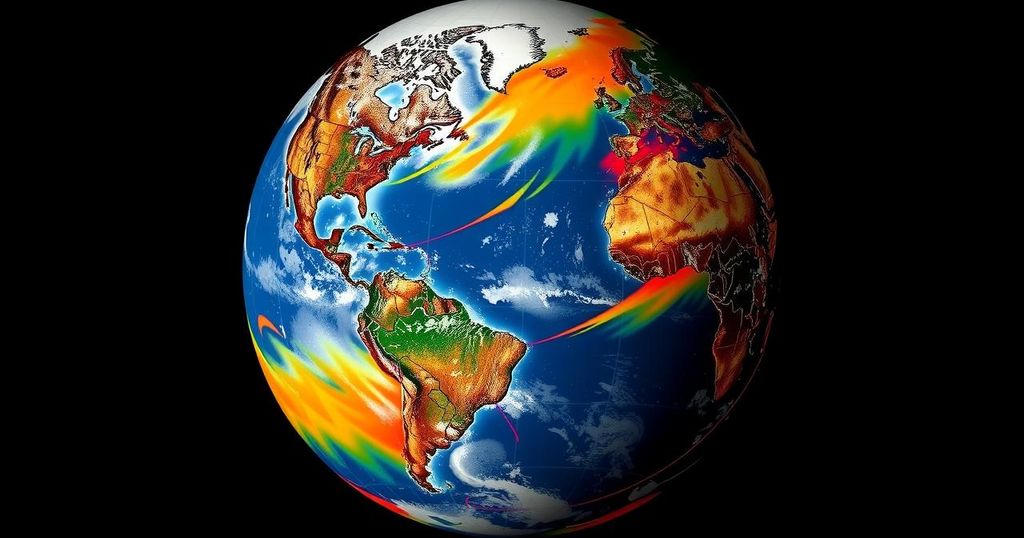Global Warming Projections Unchanged for Third Year Amid Climate Talks

Recent analysis reveals that for the third year in a row, global warming projections remain unchanged due to stagnant climate action. With projections now indicating a 2.7 degrees Celsius increase, major economies like China and the U.S. are contributing to worsening outlooks. Discussions in Baku focus on financial support for developing nations, with calls for $1 trillion annually to combat climate change and transition to sustainable energy.
For the third consecutive year, efforts to mitigate climate change have failed to produce a reduction in projected global warming, with recent developments in major economies like China and the United States likely exacerbating the situation. According to an analysis published prior to the 29th United Nations climate talks in Baku, Azerbaijan, the world is anticipated to warm by 2.7 degrees Celsius compared to pre-industrial levels, as reported by the Climate Action Tracker. The increasing emissions and stagnant temperature projections have led to growing skepticism regarding the effectiveness of COP negotiations, as articulated by Bill Hare, CEO of Climate Analytics. He remarked, “To me it feels broken.” The current global temperature has already risen 1.3 degrees Celsius, nearing the critical 1.5-degree target established at the Paris Agreement in 2015. This rise, primarily attributable to human activities such as fossil fuel combustion, is responsible for the increasingly severe weather phenomena worldwide, including droughts and devastating floods. Regarding future projections, the Climate Action Tracker indicates that even under optimistic scenarios, warming may reach 1.9 degrees Celsius, a slight increase from previous estimates. This upward trend is largely influenced by China’s higher-than-expected emissions. In contrast, upcoming U.S. elections pose the risk of regression in climate policies, with potential increases of 0.04 degrees Celsius in warming projections if conservative strategies prevail. In light of these challenges, discussions in Baku center on how affluent nations can assist developing countries in transitioning to sustainable energy systems and addressing the impacts of climate change. The financial commitment framework established to support these efforts is under review, with calls from a coalition of developing nations for $1.3 trillion annually in climate finance. An independent group of experts has also suggested a need for about $1 trillion per year for various climate-related initiatives—not limited to governmental assistance. The overall requirement for climate adaptation might exceed $2.4 trillion annually across all nations. The report emphasizes that substantial investments are required to transition towards a clean, low-carbon economy while ensuring resilience against climate impacts. Looking ahead, it is essential that advanced economies demonstrate a credible commitment to support developing nations as they navigate the complex challenges posed by climate change. The urgency of the situation is echoed in academic analyses and expert opinions, which highlight the need for collective action to mitigate climate impacts and achieve sustainability goals.
The current report highlights the stagnation in climate change mitigation efforts and the geopolitical factors influencing future warming projections. It underscores the critical importance of the upcoming United Nations climate talks, where nations are expected to reassess their commitments to emission reductions and financial support for developing countries tackling climate change. This context is essential for understanding the broader implications of inaction and the dire need for collaborative solutions among nations.
In conclusion, despite ongoing international discussions, significant barriers remain in reducing global warming projections and effectively combatting climate change. The continuing rise in emissions, particularly from major emitters like China and potential policy regressions in the United States, poses a serious threat to global climate goals. As nations convene in Baku for climate talks, the emphasis on substantial financial commitments to assist developing countries is critical. Without increased investment and coordinated action, the world may continue on a trajectory of perilous climate change.
Original Source: www.voanews.com






